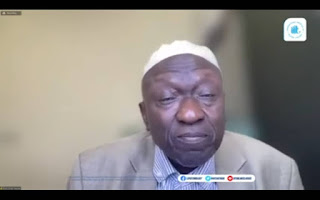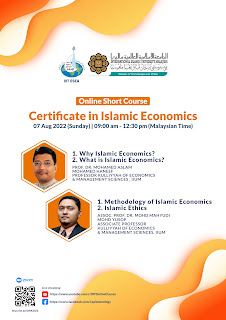Fiqh, Usul al Fiqh and Islamic Economics are important and relevant disciplines that young Muslim scholars should strive to learn and master. This was the message from IIIT Secretary General Prof. Omar Hassan Kasule to participants during the launching ceremony of the online certificate courses for Fiqh & Usul al Fiqh and Islamic Economics organized by IIITESEA for the year 2022. In his speech, Prof. Kasule reminded the participants that while Imam al-Shafi’i is regarded as the first person who systematised and developed Usul al Fiqh, the discipline had evolved gradually over many years since the period of the companions of the Prophet Muhammad (pbuh). He noted that other prominent Muslim scholars such as Imam Abu Hanifah, Imam al Ghazali, Imam al Juwayni and many others have contributed to the field of Usul al Fiqh. By establishing a powerful methodology for deriving legal rulings from the main sources of Shariah i.e., Qur’an, Sunnah, Ijma’, Qiyas, etc., Prof Kasule observed that Usul al Fiqh offers a unique intellectual platform for problem solving that could also be utilised in other academic disciplines such as Islamic economics so as to help researchers to find solutions to contemporary economic and social problems facing the Ummah.
Prof. Kasule commended IIITESEA for organising the online certificate programmes and thanked all the trainers who would be running the classes for the duration of the programme. Finally, he urged the participants to take full advantage of the opportunity to equip themselves with the knowledge and skills that will be made available during the courses. Earlier, Prof. Emeritus Dato’ Wira Jamil Osman, as the Director for the Online Courses delivered his welcoming remarks. He thanked IIUM especially the Deans and lecturers from AbdulHamid AbuSulayman Kuliyyah of Islamic Revealed Knowledge and Human Sciences (AHAS-KIRKHS) and Kuliyyah of Economics and Management Sciences (KENMS) for their full support. He also thanked the participants from more than 60 countries for their participation. Both Prof Dr Shukran Abdul Rahman as the Dean of AHAS-KIRKHS and Prof Dr Prof Dr Gairuzazmi Mat Ghani as the Dean for KENMS thanked IIIT and looked forward to the success of the online courses. Prof. Dato’ Dr. M. Fauzan Noordin, the Director of IIITESEA affirmed IIIT’s commitment to future collaboration with IIUM and expressed his hope that the online courses series would be further developed into a Diploma or Professional Certificate Program recognised by relevant certification agencies.
The sessions for the Online Courses on Fiqh and Usul Fiqh were scheduled for every Saturday from 09:00am to 12:30pm Malaysian time. Each lecturer is given 45-minutes teaching slots for six consecutive weeks for the same subject where four subjects are offered every week.
Below is the list of lecturers and subjects taught for Fiqh and Usul al-Fiqh:
The Islamic Worldview (Tasawur al Islami)
2 Asst. Prof. Dr. Saidatolakma binti Mohd Yunus
Islamic Jurisprudence (Al-Fiqh al-Islami)
Principles of Islamic Jurisprudence (Usul al-Fiqh)
Islamic Legal Maxims (Al-Qawa’id al-Fiqhiyyah)
Objectives of the Shari‘ah (Maqasid al-Shari‘ah)
Concept of Halal and Haram in Shariah (Al Halal wa al Haram fi al-Shariah)
Juristic Study of Financial Contracts (Fiqh al-‘Uqud al-Maliyyah)
Comparative Jurisprudence (Al-Fiqh al-Muqaran)
Contemporary Juristic Issues (Qadaya Fiqhiyyah Mu‘asirah)
Banking and Financial Markets (Muamalat Masrafiyyah wa Aswaq Maliyyah)
Application of Fiqh and Usul Fiqh in Islamic Banking and Finance
Application of Maqasid al-Syariah in Management, Hospitality, Banking and Finance
The Online Courses for Islamic Economics were scheduled for every Sunday from 09:00am to 12:30pm Malaysian time. Instructors included 17 lecturers from KENMS teaching on various subjects offered by the Kuliyyah. Below is the list of lecturers and subjects taught:
1 Prof Dr Gairuzazmi Mat Ghani
• Production I and II
• Challenges in Realising Islamic Economic Goals I and II
2 Prof Dr Mohamed Aslam Mohamed Haneef
• Why Islamic Economics?
• Islamic Worldview
• The Way Forward for Islamic Economics I and II
• The role of Central Bank and Monetary Policy
• Money and Financial System
• Introduction to Microeconomics
• Market from Islamic Perspectives
• National Output and Human Well-Being
• Consumption I and II
• Methodology of Islamic Economics
• Islamic Ethics
• Money and Financial System
• Islamic Social Finance
• Third Sector Economy
• Market Structure
• Issues related to Market Structure
• Labour Issues in Islamic Economics
• Introduction to Macroeconomics
• Islamic Financial System 1: Theory and Aspirations
• Islamic Financial System II: Criticism and Reality
• Basic Concepts in Islamic Economics I and II
• The Role of Turath in Developing Islamic Economics
• Maqasid al-shariah and Resource Allocation
• Macroeconomic Issues and Goals
• The Role of the Government and Fiscal Policy
• Riba’ and its Adverse Effects
• Externalities and Circular Economy I and II
• Fiqh for Economists I and II
• History of Islamic Economics Thought I and II
• Public Finance I and II
• Islamic Economic System
• Comparative Economic Systems
• The Concept of Development
• Poverty and Inequality
• International Economics, Trade and Cooperation I and II
All classes are streamed live through ZOOM, Facebook and Youtube channels. Participants are qualified to receive Certificate of Completion if they attended minimum 80% of the classes through any online platform as above. Recording of the classes is accessible at https://www.youtube.com/c/IIITOnlineClasses.






No comments:
Post a Comment